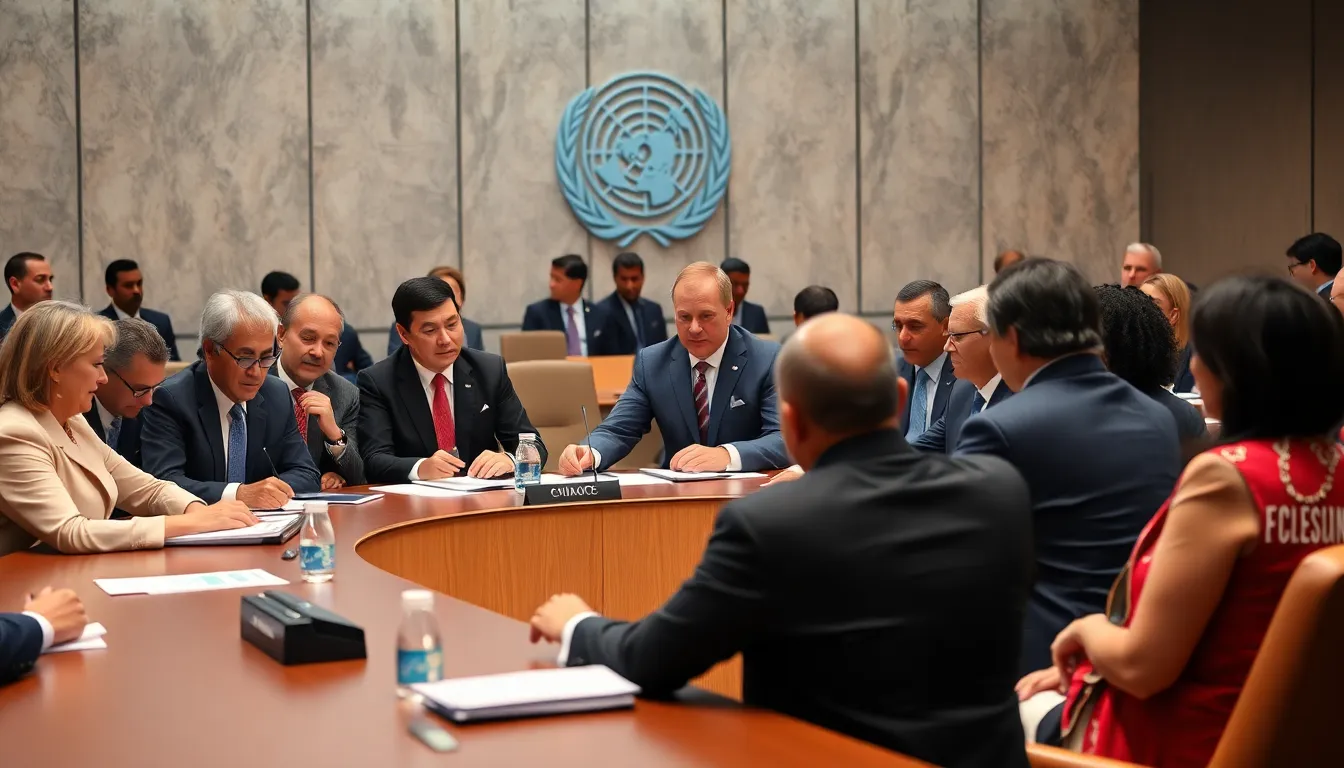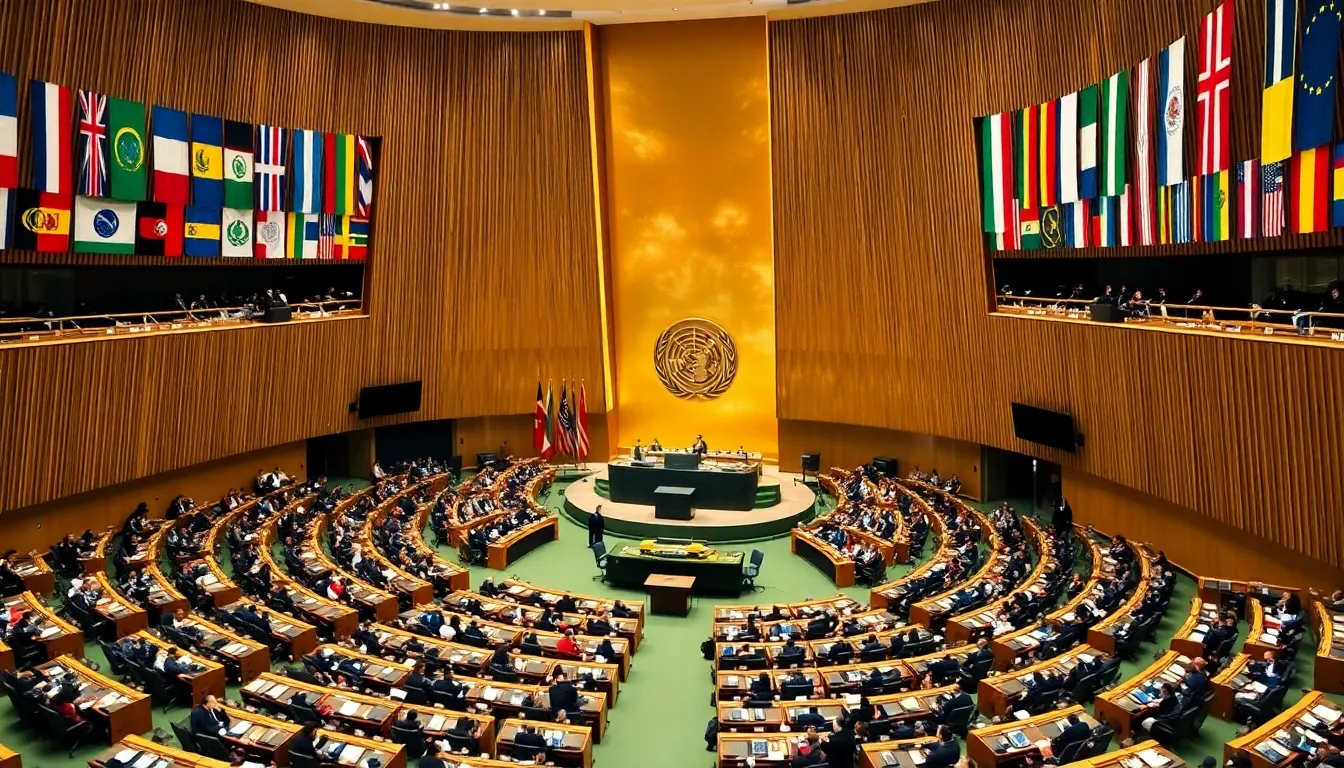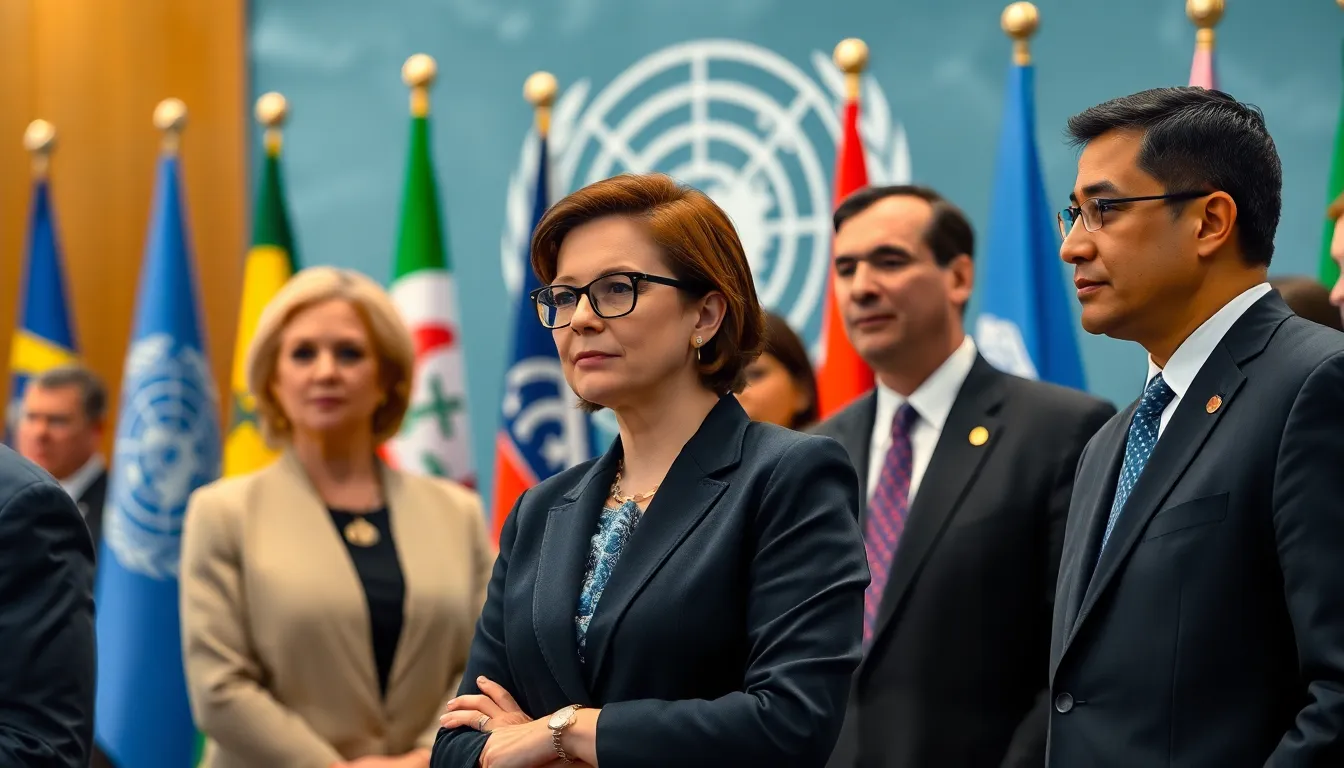The United Nations is like that friend who always knows what’s going on in the world—minus the gossip and drama, of course. From climate change initiatives to peacekeeping missions, the UN is at the forefront of tackling global challenges. But let’s face it, keeping up with their updates can feel like trying to read a novel in a foreign language.
Table of Contents
ToggleOverview of United Nations Updates
The United Nations (UN) consistently addresses pressing global issues. Climate change, peacekeeping, and humanitarian efforts remain primary focuses. Recent sessions highlighted the urgency of sustainable development goals, emphasizing the need for collective action among member states. Reports indicate that significant strides in renewable energy adoption have been noted over the past year.
Humanitarian aid also garnered attention, with funding appeals reported to exceed $40 billion in 2023. Global partnerships play a critical role in this context, as they facilitate resource sharing and strategy development. The UN’s Climate Change Conference (COP) brought together representatives from over 190 countries, further underscoring the international commitment to tackle climate challenges.
Updates from the UN Security Council have spotlighted ongoing conflicts and diplomatic initiatives, with resolutions aimed at conflict prevention frequently discussed. These sessions involve active participation from various member nations working on peace initiatives and conflict resolution strategies. Recent assessments revealed that peacekeeping missions are experiencing budgetary constraints, prompting discussions on efficiency and resource allocation.
Meanwhile, initiatives addressing human rights violations continue to expand. New frameworks promote accountability and protection for vulnerable populations. Statistics show that more than 80 resolutions targeting human rights abuses have been adopted in recent years.
The UN’s updates reflect significant progress, persistent challenges, and the collaborative effort required to address global issues effectively.
Recent Resolutions and Decisions


The latest resolutions and decisions from the United Nations reflect ongoing efforts to address global challenges effectively. Significant developments span across various bodies within the UN.
Highlights from the General Assembly
Resolutions adopted during the General Assembly have emphasized cooperation among member states. Recent sessions featured a focus on renewable energy initiatives and climate action commitments. More than 190 nations participated, underscoring global unity. One notable resolution aims to enhance funding for sustainable development projects, addressing pressing challenges in low-income countries. Another key point included calls for greater collaboration on public health initiatives, especially in response to the COVID-19 pandemic.
Key Security Council Actions
The UN Security Council has taken decisive actions concerning ongoing global conflicts. Resolutions promoting peacekeeping efforts in conflict zones received approval, aiming to address humanitarian crises. Multiple discussions centered on resource allocation for peacekeeping missions, especially under budget constraints. Recent actions included authorizing missions to regions experiencing violence and promoting diplomatic initiatives to prevent escalation. In a notable move, the Security Council condemned recent human rights violations, reflecting the commitment to accountability and justice for affected populations.
Humanitarian Efforts and Initiatives
The United Nations continues to lead global humanitarian efforts amidst pressing crises. These initiatives aim to address urgent needs and promote resilience.
Response to Global Crises
Responses to global crises have intensified as natural disasters, armed conflicts, and pandemics threaten millions. In 2023, the UN proposed funding appeals exceeding $40 billion to support humanitarian operations. Relief efforts focus on delivering food, medical supplies, and shelter to affected populations. Coordination among member states and non-governmental organizations fosters a comprehensive approach to disaster response. Recent initiatives include increasing access to clean water and sanitation facilities to combat health risks in vulnerable areas.
Sustainable Development Goals Progress
Commitment to the Sustainable Development Goals remains a priority for the UN. Recent sessions highlighted advancements in clean energy adoption and climate action. Over 190 countries actively participated in discussions, reinforcing dedication to achieving these goals by 2030. Investments in sustainable development projects have surged, particularly in low-income countries, showcasing collaborative efforts. Public health initiatives emerged in response to COVID-19, emphasizing the importance of global cooperation to improve health systems and ensure equitable access to resources.
United Nations Updates on Climate Change
The UN actively addresses climate change through various agreements and commitments made by member states. Recent discussions during the Climate Change Conference (COP) yielded key commitments from over 190 countries to enhance climate resilience and encourage carbon neutrality. Nations pledged to increase investments in renewable energy, aiming for a substantial reduction in greenhouse gas emissions by 2030. Collaborative efforts also emphasize the importance of supporting vulnerable communities to adapt to climate impacts.
Latest Agreements and Commitments
Current agreements focus on strengthening international cooperation in combating climate change. Delegates from multiple countries recently endorsed the “Glasgow Climate Pact,” which promotes a transition towards sustainable energy sources. Specific initiatives include a target of reducing coal use and enhancing climate finance to developing nations, with funding targets listed at $100 billion annually. These commitments reflect a collective determination to meet global climate targets and ensure an inclusive response to this pressing challenge.
Impacts on Global Policies
Global policies are evolving in response to UN climate initiatives. Policy frameworks established during COP meetings influence national legislation and distribute resources toward clean technologies. The emphasis on climate action increasingly integrates sustainability into economic planning, encouraging industries to adopt greener practices. Enhanced monitoring mechanisms are being implemented, ensuring countries adhere to their climate pledges. This shift toward accountability fosters a more transparent approach to global climate governance, reinforcing the urgency of collaborative action.
Future Directions and Challenges
Future directions for the United Nations encompass various global priorities. The Sustainable Development Goals play a key role in shaping policies aimed at reducing poverty and addressing inequality. Recent data indicate the need for investments in renewable energy and climate resilience. Over 190 countries reaffirmed their commitment during the Climate Change Conference, signaling a collaborative effort toward sustainable practices.
Challenges persist in providing humanitarian aid. Funding appeals exceeded $40 billion in 2023 to support operations in crisis-affected regions. Coordination among member states and NGOs must improve to ensure effective responses to natural disasters and conflicts. Efforts to increase access to clean water and sanitation facilities highlight the urgency of addressing basic needs.
The UN Security Council faces obstacles in conflict resolution. Diplomatic initiatives require more robust resource allocation for peacekeeping missions, particularly as budgetary constraints narrow options. Continued attention to human rights violations remains crucial, with more than 80 resolutions passed to enhance accountability and protect marginalized communities.
Climate initiatives are reshaping global policies. The emphasis on reducing greenhouse gas emissions influences national legislation and resource distribution. Innovative monitoring mechanisms are necessary to ensure compliance with climate agreements, fostering transparency in governance.
Efforts to enhance public health systems reflect the impact of global cooperation, particularly in response to COVID-19. Investing in health initiatives demonstrates a commitment to equitable access to resources. Overall, these updates reveal significant advancements alongside persistent challenges, underscoring the need for unified action to tackle pressing issues worldwide.
The United Nations remains a pivotal force in addressing global challenges. Its commitment to sustainable development and humanitarian efforts reflects a unified approach to pressing issues. Recent advancements in climate action and humanitarian aid underscore the urgency of collective action among member states.
As the UN navigates complex conflicts and resource allocation, the need for innovative solutions becomes increasingly clear. The ongoing dedication to the Sustainable Development Goals serves as a guiding framework for future initiatives.
With continued collaboration and investment, the UN can enhance its impact on global stability and resilience. The road ahead requires unwavering commitment and cooperation to ensure a better future for all.







